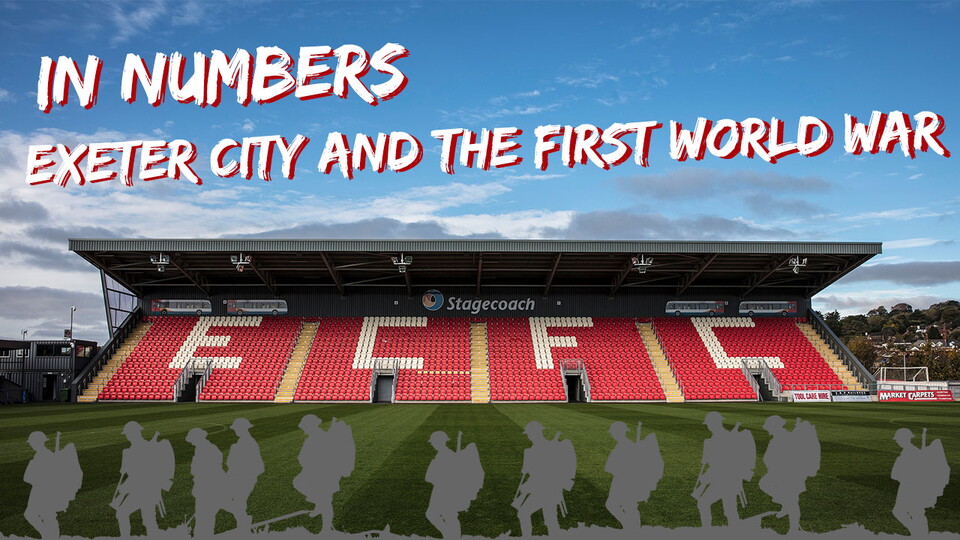With November 11 marking the centenary of the end of the Great War, it seemed fitting to produce a special edition of 'In Numbers,' honouring the 900,000 British and Commonwealth soldiers that gave their lives during the conflict.
Although the club, in its current form, was only 10 years old when war was declared in August 1914, as the following statistics show, its fans, players and staff, made a heavy contribution to the British war effort.
9,057 – When war was declared on August 5, 1914, the Grecians were completing the 9,057-mile trip home from their famed tour of South America. The journey proved to be a tense one, with their ship, SS Alcantara, having to take special precautions to avoid handing the German Navy a golden capture. Their perilous situation was underlined on the voyage’s final leg, when three shots were fired across the ship’s bow. Thankfully, they were warning shots from allied vessels, and the players were able to arrive safely at Liverpool on August 10.
17 – Whilst the club’s touring party was on its way home, a number of their club mates had already rushed to the colours. The first of these was reserve team captain Sergeant George Thomas ‘Cadie’ White, who deployed to France with the third Devons just 17 days after the outbreak of war. Sadly, on October 30, 1914, he became the first Grecian to perish, as one of 5,000 Fifth Division casualties during the Battle of Basée.
19,240 – Another City man who enlisted during the war’s early days was Fred Bailey, who arrived in France with the Royal Army Medical Corps in the autumn of 1914. Described in the Western Timesas “one of the most promising athletes Devon has ever produced”, “he was a dashing centre-forward and a prolific scorer for Exeter City...” Having previously been shot in the arm, and only recently returned to the front, he was tragically killed on July 1, 1916, whilst carrying a wounded comrade through a trench. Fred was one of 19,240 British soldiers who died on the first day of the Battle of the Somme.
3 – Devastatingly, Fred Bailey was not the only Grecian to perish on the Somme, with the club losing a further three former players during the four month long battle. The first to fall was former England international, Lieutenant Evelyn Lintott, who, like Bailey, was killed on the first day of the fighting. He was followed by Sergeant Arthur Evans, who fell on July 31. The final former player to perish in the battle was Lintott’s close friend, and club founding member, Second-Lieutenant Percy Worner, who was killed in early September.
40 – Unfortunately, with an estimated 400,000 ex-servicemen left permanently impaired by the war, surviving its ravages did not necessarily ensure a return to normality. One such man was City midfielder Billy Smith, a veteran of the South America tour, who, according to the press “had the makings of one of the best halfbacks in England.” Tragically, having just secured a post-war move to Everton, he was shot through the leg on the day after the armistice, having it amputated a year later. A few days afterwards, the Exeter City supporters’ club held a collection in his honour before a home game against Northampton Town, raising £40 (£4,000 in today’s money.)
203 – Thankfully, there were a number of Grecians who, having survived military service, went on to have successful footballing careers. Perhaps the most notable is former goalkeeper, Dick Pym, who made 203 appearances in red and white. Sold on to Bolton Wanderers in 1921 for £5,000, a huge sum in those days, he would go on to win the FA Cup in 1923, 1926 and 1929, earning three England caps in the process.
13 – Overall, 13 former Exeter City players lost their lives between 1914 and 1918. Although their bodies rest across the globe, from the fields of Flanders to the seas surrounding Egypt, their names are immortalised together in the club’s memorial garden, just a stone’s throw away from the field they all called home. Today, and always, we will remember them.
